When you walk into a room, the first thing you see is a British Shorthair kitten’s round face. These chubby cats, with their soft fur and loving nature, win the hearts of many. They come in various colors, but their charm is undeniable.
British Shorthair kittens cost between $1,200 and $1,600 USD. They are not just beautiful but also calm and friendly. This makes them perfect for families. Starting your journey with one of these kittens means discovering a breed full of history, unique looks, and lots of personality.
Table of Contents
Introduction to British Shorthair Kittens
British Shorthair kittens have won the hearts of many cat lovers around the world. They have a long history, dating back to ancient Rome. These kittens are known for their special looks and personalities, making them great friends.
Historical Background of the Breed
The British Shorthair is one of the oldest cat breeds in Great Britain. It has roots going back to the Roman invasion. Over time, it was improved by mixing it with other breeds like Russian Blues and Persians. This led to its official recognition in the 1970s.
Distinctive Physical Characteristics
British Shorthair kittens have round, strong bodies and soft, thick fur. They come in many colors and patterns. These cats are medium-sized, weighing 7 to 17 pounds. Females are a bit smaller than males. They grow slowly, both physically and mentally.
Temperament Overview
British Shorthair kittens are known for being calm and friendly. They are great pets for many families. They are loyal, loving, and easy to get along with, making them a favorite among families and other pets.
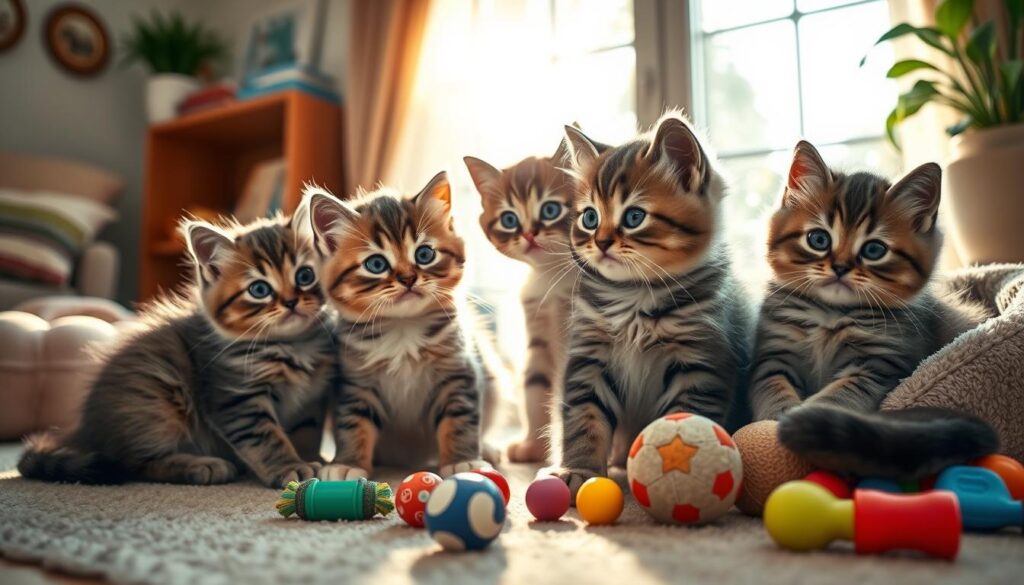
“British Shorthair kittens are the perfect blend of regal elegance and playful charm, captivating all who encounter them.”
Colors and Coat Varieties Available
British Shorthair kittens come in a wide range of colors and patterns. They include the classic blue and the rare fawn. This makes them a favorite among cat lovers everywhere.
The blue British Shorthair is especially popular. It has a light to medium blue-gray coat without spots or stripes. Their bright golden, orange, or copper eyes add to their beauty.
| Color Variety | Characteristics | Rarity |
|---|---|---|
| Black | Jet-black coat with no brown patches, black nose and paw pads, orange eyes | Rare |
| Chocolate | Warm, chocolatey brown coat with pink nose and paw pads, copper eyes | Uncommon |
| Cinnamon | Coat with a copper or reddish undertone, pink nose and paw pads | Uncommon |
| Fawn | Soft, mushroom-colored coat with rosy hues, pink nose and paw pads | Rare |
The British Shorthair also has a wide range of coat patterns. You can find tabby, tortoiseshell, bicolor, and tricolor patterns. These patterns make each British Shorthair Kitten unique and special.
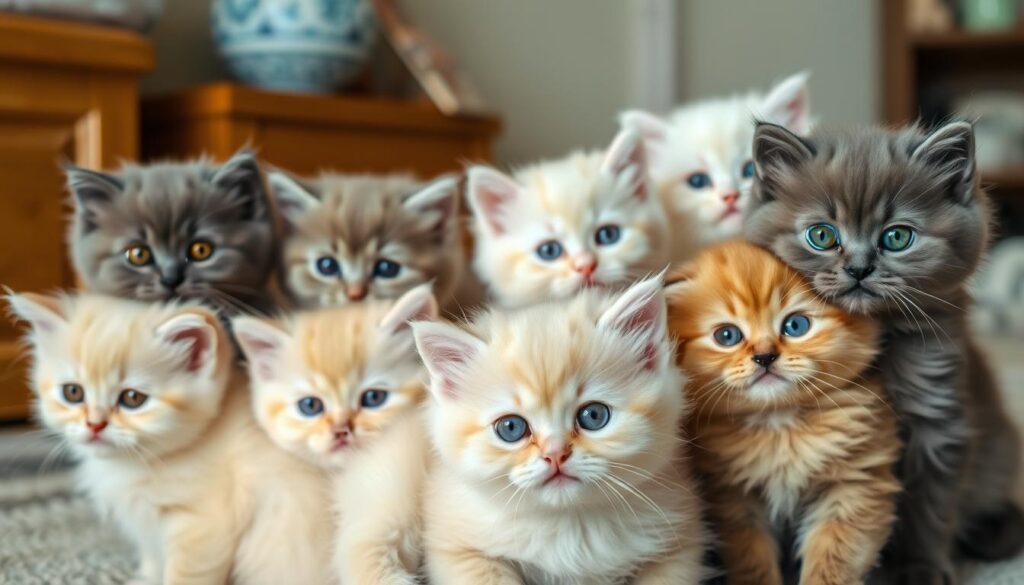
British Shorthair cats are known for their stunning looks and regal demeanor. Whether you prefer the classic blue or something more rare, there’s a color for everyone. This breed truly offers something for every cat lover.
The Classic Blue British Shorthair: Most Popular Choice
The classic blue British Shorthair is the top pick among cat lovers. It’s known for its beautiful blue color, thanks to special genes. These genes make it look unique and stunning.
Understanding the Blue Coloration
The blue British Shorthair, also called the “British Blue,” has a special color. This color comes from a mix of genes. It’s a solid blue coat, the oldest and most loved color in the breed.
Genetic Factors Behind the Blue Coat
The blue color in British Shorthairs comes from a recessive gene. This means both parents must have the gene for their kittens to have blue coats. The shade of blue can vary, from light to dark, based on the cat’s genes.
Care Requirements for Blue Coats
Keeping a blue British Shorthair’s coat looking great needs regular grooming. They have a thick, double coat that should be brushed weekly. This prevents tangles and keeps their coat shiny. Taking good care of their grooming will keep your blue British Shorthair looking fabulous.
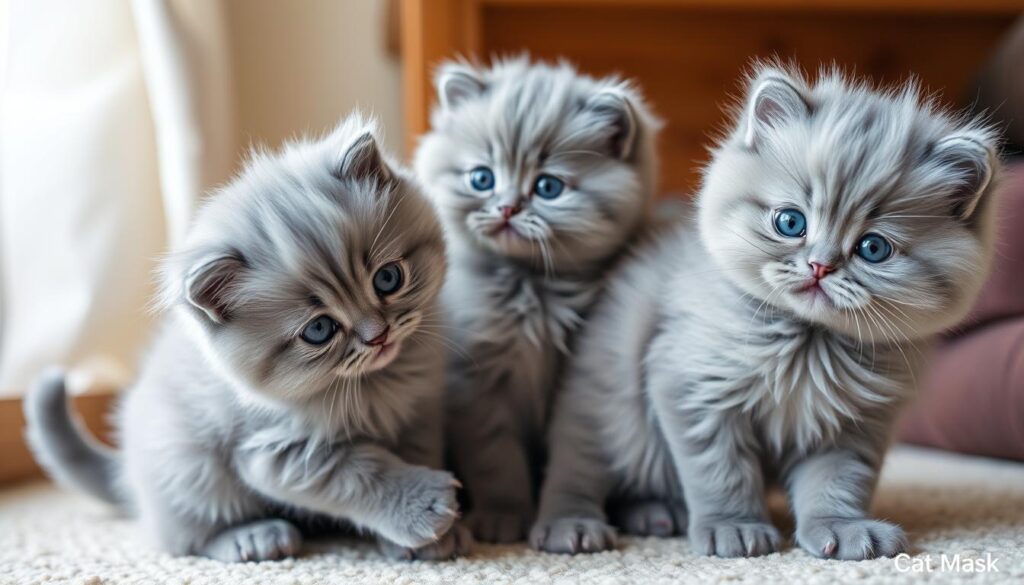
“The blue British Shorthair is a true classic, captivating cat lovers with its regal and sophisticated appearance.”
| Coat Color | Popularity | Eye Color | Nose/Paw Pads |
|---|---|---|---|
| Blue | Most Common | Copper or gold | Pink |
| Cream | Common | Orange, copper, or golden | Pink |
| Red (Ginger) | Uncommon | Copper or orange | Brick red |
| Black | Rare | Orange | Black |
| Fawn | Rare | Copper or gold | Pink |
| Tortoiseshell | Uncommon | Varies | Varies |
Personality Traits and Behavior Patterns
Get ready to fall in love with British Shorthair kittens. They are known for being calm and gentle. This makes them great friends for families and individuals.
These kittens are not too active. They love a relaxed life, which suits their adaptable nature well.
Despite being laid-back, they are not dull. They are curious and love to explore. They also learn quickly and enjoy training.
British Shorthair kittens love people. They enjoy being close and cuddling. But they also like to play alone, making them perfect for busy lives.
Looking for a loyal friend or a low-maintenance pet? British Shorthair kittens are perfect. They will bring joy and companionship into your life.
| Personality Trait | Rating (out of 5) |
|---|---|
| Family Friendliness | 3 |
| Intelligence | 3 |
| Liking Other Pets | 5 |
| Vocalization | 4 |
| Activity Level | 3 |
| Grooming Needs | 4 |
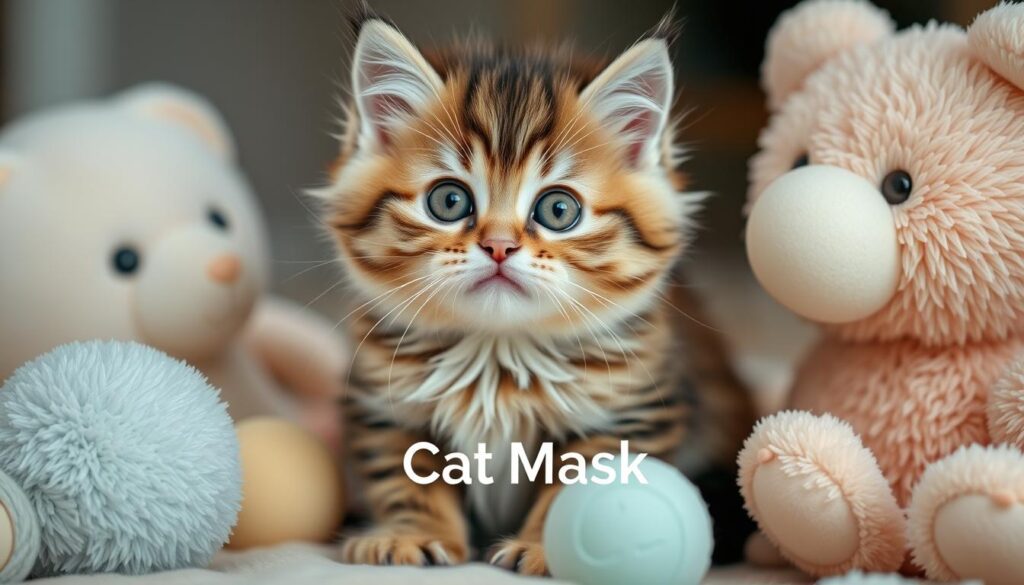
The British Shorthair is a beloved cat breed. They are calm and gentle. These chubby felines are adaptable and make great friends for everyone.
Health Considerations for Your British Shorthair Kitten
Having a British Shorthair kitten means you must care for their health. This breed is mostly healthy, but some issues can arise. Knowing these and how to prevent them is key to your kitten’s well-being.
Common Health Issues
British Shorthairs can face Hypertrophic Cardiomyopathy, a heart disease. They might also get Hemophilia B, Cataracts, and Polycystic Kidney Disease. Rarely, they get FALPS or FIP from their family.
Preventive Care Measures
Regular vet visits are crucial for your kitten’s health. Your vet will check them, give vaccinations, and create a care plan. This plan will fit your kitten’s specific needs.
Vaccination Schedule
- 6-8 weeks: Distemper, parvovirus, calicivirus, rhinotracheitis
- 10-12 weeks: Repeat distemper, parvovirus, calicivirus, rhinotracheitis
- 14-16 weeks: Repeat distemper, parvovirus, calicivirus, rhinotracheitis
- 1 year: Rabies, distemper, parvovirus, calicivirus, rhinotracheitis
- Annually: Rabies, distemper, parvovirus, calicivirus, rhinotracheitis
Stick to a detailed vaccination schedule and vet visits. This will keep your British Shorthair kitten healthy and joyful for years.
Essential Care and Grooming Tips
As proud owners of a British Shorthair kitten, you’ll find joy in caring for this chubby feline. Their dense, plush coats need regular grooming to stay healthy and vibrant. While they don’t need as much grooming as long-haired breeds, consistent care is key to avoid matting and reduce shedding.
To keep your kitten’s coat in great shape, brush them at least once a week. In spring and fall, you might need to brush them 2-3 times a week to handle the extra hair. A good slicker brush and metal comb will make grooming easier and more fun for both you and your kitten.
Dental care is also vital for kitten care in British Shorthairs. These chubby felines can get dental and gum problems, so brush their teeth at least once a week. This helps prevent painful conditions and keeps them healthy overall.
- Brush your British Shorthair kitten’s coat at least once a week, or more during shedding seasons.
- Invest in a slicker brush and metal comb to make grooming easier and more effective.
- Incorporate regular tooth brushing into your kitten’s routine to maintain dental health.
- Trim your kitten’s nails regularly to prevent scratching and potential injuries.
- Schedule annual veterinary checkups to catch any health issues early on.
| Grooming Frequency | Dental Care | Health Checkups |
|---|---|---|
| Weekly brushing, more during shedding | Weekly tooth brushing | Annual vet visits |
By following these essential British Shorthair Kittens care and grooming tips, you’ll keep your chubby feline happy, healthy, and looking their best. Remember, a well-groomed and cared-for kitten is a content and confident companion.
Dietary Requirements and Feeding Schedule
Keeping your British Shorthair kitten’s diet balanced is key for their health and growth. They need high-quality kitten food rich in proteins and nutrients. It’s also important to control their food portions to prevent them from getting too chubby.
Recommended Food Types
Choose kitten-specific food for your British Shorthair. These diets meet their growth and energy needs. Wet canned or freeze-dried raw foods are great because they taste good and are moist.
Portion Control Guidelines
Kittens should eat 8%-10% of their body weight in food. As they grow, this amount will decrease. By 5 months, it drops to 4%-8%, and by 12 months, it’s 2%-3%. Adult cats need about 2%-3% of their body weight in food each day.
To keep your kitten at a healthy weight, stick to a feeding schedule and watch portion sizes. If your cat is overweight, start by reducing their food intake by 2%-5% to help them lose weight. If they’re underweight, increase their food by 2%-5% each week to help them gain weight.
| Cat Age | Daily Food Intake (% of Body Weight) |
|---|---|
| Kittens (0-5 months) | 8%-10% |
| Kittens (5-12 months) | 4%-8% |
| Adults | 2%-3% |
| Seniors | 2%-3% (slightly less due to decreased activity) |
By following these guidelines and feeding your British Shorthair kitten a nutritious diet, you can help them stay healthy and live a long, happy life.
Training and Socialization Methods
British Shorthair kittens are smart and can learn with positive methods. Start socializing them early to help them grow into happy cats. These cats love gentle teaching and respond well to consistent training.
Teaching your kitten basic commands like sit and stay is fun for both of you. Use treats and praise to encourage good behavior. Playing with them and using interactive toys keeps their mind sharp and prevents boredom.
It’s crucial to socialize British Shorthairs early. Introduce them to different people, animals, and places in a safe way. This builds their confidence and makes them well-adjusted for kitten training and British Shorthair Kittens. With patience and consistency, your feline companions will become loving and well-behaved pets.

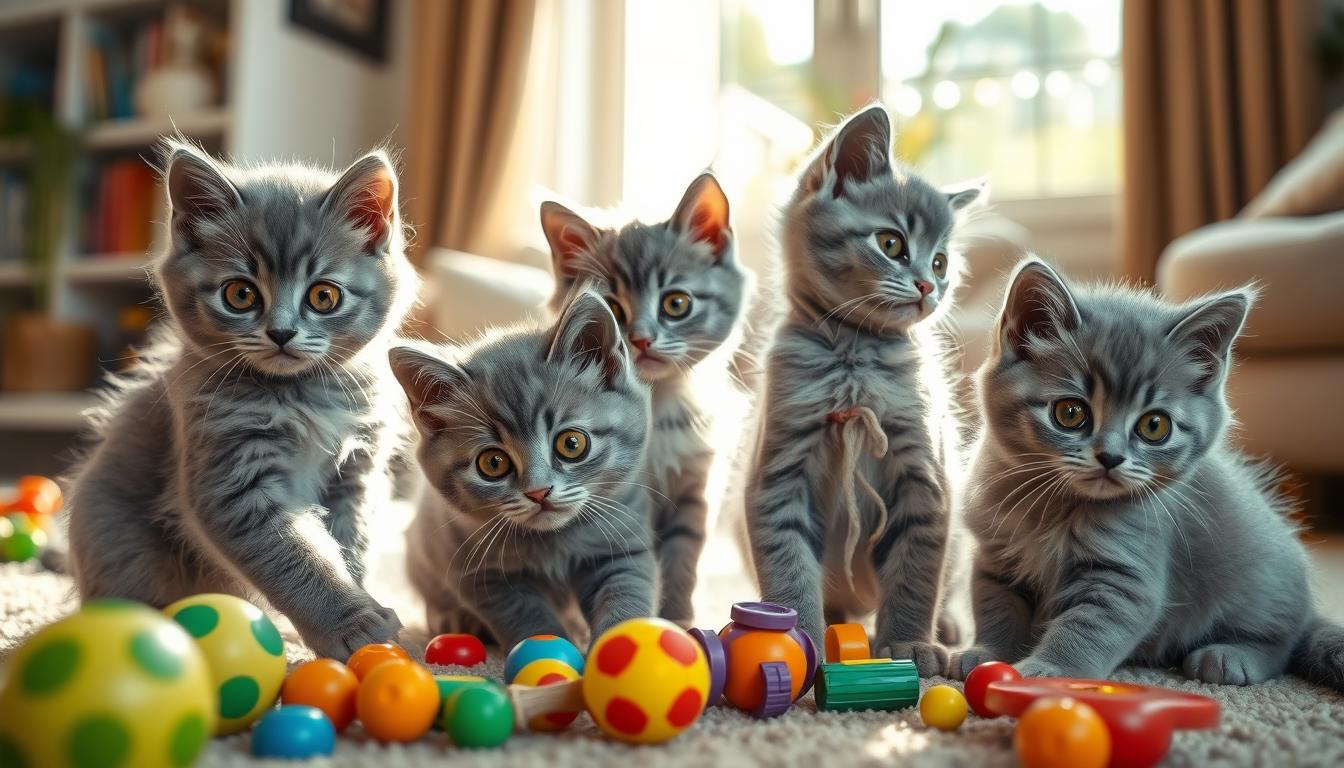
1 thought on “British Shorthair Kittens”
Comments are closed.